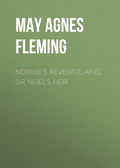
May Agnes Fleming
Sharing Her Crime: A Novel
A dull, heavy, stagnant silence hung over the mansion from morning till night. There was no more banging of doors, and flying in and out, and up and down stairs, and scolding, and shouting, and singing all in one burst, now. The squire was blue-molding – fairly "running to seed," as he mournfully expressed it – for want of his little torment.
No one missed the merry little elf more than the lusty old squire, who sighed like a furnace, and sat undisturbed in his own arm-chair from one week's end to the other. Sometimes Louis would bring over Celeste, who had nearly wept her gentle eyes out for the loss of her friend, to comfort him, and the fair, loving little creature would nestle on a stool at his feet and lay her golden head in his lap, and go to sleep. And the squire would caress her fair, silken curls with his great, rough hands, and pat her white, dimpling shoulders, and turn away with a half groan; for she was not Gipsy!
As for poor Archie, he took to wandering in the woods and shooting unoffending birds and rabbits, because it was Gipsy's favorite sport, and looked as doleful as though he had lost every friend in the world.
"Fall in love with any one else," indeed! Master Archie scorned the idea, and began to have sundry visions of joining the monks of La Trappe as soon as he grew old enough. This and his other threats of going to sea, of enlisting, of killing somebody, by way of relieving his spirits, kept poor Celeste trembling with fear for him from morning till night. And in her own gentle way she would put her arms round his neck and cry on his shoulder, and beg of him not to say such naughty things, for that Gipsy would come back yet – she knew that she would.
But Minnette, who didn't care a straw whether Gipsy ever came back or not, would laugh her short, deriding laugh, and advise him to become a Sister of Charity at once. And Celeste said she would be one when she grew up, and then she would be always near to comfort him. And Minnette's taunts always sent poor Archie off to the woods in a more heart-broken state of mind than ever before.
CHAPTER XV.
THE "STAR OF THE VALLEY."
– "Face and figure of a child,
Though too calm, you think, and tender,
For the childhood you would lend her." – Browning.
The winter was now drawing on. The short, bleak November days had come, with their chill winds and frosty mornings. Miss Hagar looked at the slight, delicate form and pale little face of her protegee, and began to talk of keeping her at home, instead of sending her to school during the winter months.
Celeste listened, and never dreamed of opposing her wishes, but stole away by herself, and shed the first selfish tears that had ever fallen from her eyes in her life. It was so pleasant in school, among so many happy young faces, and with the holy, gentle-voiced Sisters of Charity, and so unspeakably lonesome at home, with nothing to do but look out of the window at gray hills and leafless trees, and listen to the dreary sighing of the wind. Therefore Celeste grieved in silence, and strove to keep back the tears when in Miss Hagar's presence, lest she should think her an ungrateful, dissatisfied little girl.
One morning, however, as Miss Hagar entered the deserted parlor, she found Celeste sitting in the chimney-corner, her face hidden in her hands, sobbing gently to herself. A little surprised at this, for the child seemed always smiling and happy before her, Miss Hagar took her on her knee, and asked what was the matter.
"Nothing," replied Celeste, though her cheek glowed crimson red, as she felt she was not speaking the truth.
"People don't cry for nothing, child!" said the aged spinster, severely. "What's the matter?"
"Please, Miss Hagar, I'm so naughty, but – but – I don't want to leave school."
"Don't want to leave school? Why, child, you'd freeze to death going to school in the winter."
"But Minnette goes," pleaded Celeste.
"Minnette's not like you, little lily. She's strong and hardy, and doesn't mind the cold; it only brings living roses to her cheeks; but you, little whiff of down that you are, you'd blow away with the first winter breeze."
Celeste had no reply to make to this. She only hung down her head, and tried very hard to swallow a choking sensation in her throat.
At this moment Archie burst in, in his usual boisterous manner, all aglow with snow-balling Louis. Master Rivers seemed in very good condition, notwithstanding the loss of Gipsy; though I rather think he would have been induced to knock any one down who would tell him he had forgotten her.
"What! in trouble again, little sis? Who's been bothering you now? Just give me a hint, and I'll invite them not to do it again."
"Why, the little simpleton is crying because I won't let her freeze herself to death going to school all winter!" said Miss Hagar.
"Oh, that's it – is it? Dry up your tears, then, Birdie; there's 'balm in Gilead' for you. Yesterday, that good-natured old savage, Squire Erliston, hearing me tell Louis that Celeste could not go to school owing to the distance, immediately insisted that we should all use his family sleigh for the winter. Now, Miss Hagar, see how those radiant smiles chase her tears away. We'll nestle you up in the buffalo robes, and dash off to school with you every morning to the music of the jingling sleigh-bells. Eh, puss? won't it be glorious?"
"What's that?" said Minnette, entering suddenly.
"Why, Squire Erliston has given his sleigh up to Pussy here to take her to school, and perhaps we'll take you if you're not cross, though the squire has no particular love for you."
"Thank you for nothing," said Minnette, scornfully; "but I wouldn't go if you did ask me. Before I'd be such a baby!" she added, glancing contemptuously at Celeste.
And Minnette was as good as her word, positively refusing even the stormiest mornings to go in the sleigh. Archie exhausted all his eloquence, and Celeste pleaded tearfully, offering to stay at home and let her take her place; but Minnette answered all their entreaties by a sullen "I won't." Even when Louis, the only living being to whom her high, stubborn will would bend, pleaded with her to come, she only turned away, and said, in a tone very gentle for her:
"No, Louis, don't ask me; I can't go. Why should I? I'm no trembling little coward like Celeste. I love the winter! – yes, twice as well as the summer! The summer is too still, and warm, and serene for me! But the winter, with its maddening winds and howling storms, and white, frosty ground and piercing cold breeze, sends the blood bounding like lightning through every vein in my body, until I fly along, scarcely touching the ground beneath me! Louis, walking alone through the drifted snow, I feel no cold; but in your warm sleigh beside her, my heart would feel like ice!"
"Strange, wild girl that you are! Why do you dislike Celeste so much?"
"I don't know. I never liked any one in my life – at least not more than one. Do you like her?" she said, lifting her eyes, glancing with dusky fire, to his face.
"Like her!" he exclaimed, shaking back his short, black curls, while his full, dark eye kindled – "like that lovely little creature! that gentle little dove! that sweet little fairy! beautiful as an angel! radiant as a poet's dream! bewitching as an Eastern houri! Like her! Oh, Minnette!"
She paused for a moment, and fixed her gleaming eyes on the bright, handsome face, sparkling with boyish enthusiasm; then, without a word, turned away, and fled from his sight.
And from that moment her hatred of Celeste redoubled tenfold in its intensity. Every opportunity of wounding and insulting the sensitive heart of the gentle child was seized; but every insult was borne with patience – every taunt and sarcasm met with meek silence, that only exasperated her merciless tormentor more and more. Sometimes Celeste would feel rising in her bosom a feeling of dislike and indignation toward her persecutor; and then, filled with remorse, she would kneel in the chapel and meekly pray for a better spirit, and always rise strengthened and hopeful, to encounter her arch-enemy, with her taunting words and deriding black eyes.
One last incident, displaying forcibly their different dispositions, and I have done with the children, Minnette and Celeste, forever.
The Sisters had purchased a beautiful new statue of the Madonna, and placed it in the refectory until it could be properly fixed in the chapel. The children were repeatedly forbidden to enter the refectory while it was there, lest it should accidentally be broken.
One day, the Sisters had given a conge, and their pupils were out playing noisily in the large garden and grounds attached to the convent. Minnette, who never liked to mingle in a crowd, selected three of the boldest spirits present, and proposed they should play "Puss in the corner" by themselves.
"Oh! we can't here in this great big place," was the reply; "besides, the other girls will be sure to join us."
"Let us go into the class-room, then," said the adventurous Minnette.
"Sister Mary Stanislaus is sweeping out the class-room, and she won't let us," said one of the girls.
"Well, then, there's the refectory," persisted Minnette.
"Oh! we daren't go there! Mother Vincent would be dreadfully angry. You know the new statue is there!" said the girls, aghast at the very idea.
"Such cowards!" exclaimed Minnette, her lip curling and her eye flashing. "I wish Gipsy Gower were here. She would not be afraid."
"I ain't a coward! I'll go!" cried one, following the daring Minnette, who had already started for the forbidden room. The others, yielding to their bolder spirit, followed after, and soon were wildly romping in the refectory.
Suddenly, Minnette, in her haste, rushed against the shelf where the statue stood. Down it came, with a loud crash, shivered into a thousand fragments.
The four girls stood pale, aghast with terror. Even Minnette's heart for a moment ceased to beat, as she gazed on the broken pieces of the exquisite statue. It was but for a moment; all her presence of mind returned, as she breathlessly exclaimed:
"Sister will be here in a moment and catch us. Let us run out and join the other girls, and she'll never know who did it."
In an instant they were rushing pell-mell from the room. Minnette was the last, and as she went out her eye fell upon Celeste coming along the passage. A project for gratifying her hatred immediately flashed across her mind. Seizing Celeste by the arm she thrust her into the refectory, closed the door, and fled, just as the Sister, startled by the noise, came running to the spot.
She opened the door! There stood Celeste, pale and trembling, gazing in horror on the ruins at her feet.
An involuntary shriek from Sister Stanislaus brought all the nuns and pupils in alarm to the spot. Celeste had entered the forbidden room – had, by some accident, broken the beautiful and costly statue; that was a fact self-evident to all. She did not attempt to deny it – her trembling lips could frame no words, while the real culprits stood boldly by, silent and unsuspected.
Celeste was led away to appear before "Mother Vincent," and answer the heavy charge brought against her. She well knew how it all happened, and could very easily have cleared herself; but she had just been reading a lecture on humility and self-denial, and heroically resolved to bear the blame sooner than charge Minnette. "Minnette will hate me worse than ever if I tell," she thought; "and I must try and get her to like me. Besides, I deserve punishment, for I felt dreadfully bad and naughty, when she made the girls laugh at me this morning."
So Celeste met the charge only by silence, and sobs, and tears; and Mother Vincent, leading her into the class-room, where all the girls and teachers were assembled, administered a public reproof.
"Had it been any of the other girls," she said, "she would not have felt surprised; but Celeste was such a good girl generally, she was indeed surprised and grieved. It was not for the loss of the statue she cared most – though that could scarcely be replaced – but so glaring an act of disobedience as entering the refectory could not go unpunished. Therefore, Sister Mary Joseph would lead Celeste off and leave her by herself until school was dismissed, as a warning to be more obedient in future."
And Celeste, with her fair face flushed with shame – her bosom heaving with sobs as though her gentle heart would break – was led away to the now unforbidden refectory, and left alone in her deep sorrow. The real culprits sat silent and uneasy, starting guiltily when a low, suppressed sob would now and then reach their ear. But Minnette, with her black eyes blazing with triumph, her cheeks crimson with excitement, sat bold and undaunted, proud and rejoicing in her victory.
That evening one of the girls, unable to endure the stings of conscience, went to the Mother Superior and nobly confessed the whole. The good lady listened amazed, but silent. Celeste was released, brought before her, and confronted with Minnette.
"Why did you tell this falsehood, Minnette?" said the justly indignant lady, turning to her.
"I told no falsehood, madam," she said, boldly, though her cheek glowed like fire, and her falcon eye fell beneath the keen, steady gaze of the other.
"You acted a falsehood, then, which is quite as bad," said Mother Vincent; "and I am pained beyond measure to find so artful and wicked a disposition in one so young. And you, my child," she added, drawing Celeste toward her and caressing her golden head; "why did you suffer this wrong in silence?"
"Because I deserved it, Mother; I didn't like Minnette this morning," she answered, dropping her pale face sadly.
A glance that might have killed her, it was so dazzlingly, intensely angry, shot from the lightning eyes of Minnette.
After a few brief words, both were dismissed. The sleigh stopped to take up Celeste, and Minnette walked proudly and sullenly home.
When she reached the house she found Celeste standing in the doorway, with Louis beside her, twining her golden curls over his fingers. All the evil passions in Minnette's nature were aroused at the sight. Springing upon her, fairly screaming with rage, she raised her clenched hand and struck her a blow that felled her to the ground. Then darting past, she flew like a flash up the polished oaken staircase, and locked herself in her own room; but not until the wild cry of Louis at the demoniac act reached her ear, turning her very blood to gall.
He sprang forward, and raised Celeste up. She had struck on a sharp icicle as she fell, and the golden hair clung to her face clotted with the flowing blood. Pale and senseless, like a broken lily, she lay in his arms, as, with a heart ready to burst with anguish, Louis bore her into the house and laid her on a sofa. His cry brought Miss Hagar to the spot. She stood in the doorway, and with her usual calmness surveyed the scene. Celeste lay without life or motion on the sofa, and Louis bent over her, chafing her cold hands, and calling her by every tender and endearing name.
"Some of Minnette's handiwork," she said, coming forward; "poor little white dove, that vulture would tear out your very heart if she could. But my words will come true, and some day she will find out she has a heart herself, when it is torn quivering and bleeding in strong agony from the roots."
"Oh, Miss Hagar, do you think she is dead?" cried Louis, his brave, strong heart swelling and throbbing in an agony of grief.
"No; I hope not. Ring the bell," was her answer.
Louis obeyed; and having dispatched the servant who answered it for the doctor, she proceeded to wash the blood from the wound. Doctor Wiseman came in with the utmost indifference; listened to the story, said it was "just like Minnette;" thought it ten chances to one whether she would ever recover; gave a few general directions as to how she was to be treated, and went off to sip his coffee and read the newspaper.
Louis' indignation knew no bounds.
"Leave this detestable old house," he exclaimed impetuously, to Miss Hagar; "take Celeste over to Sunset Hall, and live with us. Grandfather is rough, but kind and generous; and you and poor little Celeste will be warmly welcomed. Do come, Miss Hagar."
"No, Louis," said Miss Hagar, shaking her head. "I thank you for your kind offer; but I cannot be dependent on anybody. No; I cannot go."
"But, good heavens! Miss Hagar, will you stay and let that hawk-heart Minnette kill this poor, gentle little soul, who is more like an angel than a living child."
"No," said Miss Hagar; "there is a cottage belonging to me about half a mile from here, at a place called Little Valley. You know it, of course. Well, I shall have it furnished; and as soon as Celeste recovers, if she ever does recover, poor child, I shall go there. Thank the Lord! I'm able to support myself; and there she will be beyond the power of Minnette."
"Beyond the power of Minnette," thought Louis, as he walked homeward. "Will she ever be beyond the power of that mad girl? What can have made her hate that angelic little creature so, I wonder?"
Ah, Louis! Ten years from hence will you need to ask that question?
The indignation of all at Sunset Hall at hearing of Minnette's outrageous conduct was extreme. The squire was sure that "bedeviled tigress would never die in bed." Mrs. Gower's fat bosom swelled with indignation, and even Lizzie managed to drawl out "it was positively too bad." And immediately after hearing it Mrs. Gower ordered out the sleigh, and loading it with delicacies for the little sufferer, set out for Deep Dale, where she found her raving in the delirium of a brain fever.
Days and weeks passed ere Celeste rose from her bed, pale and weak, and frailer than ever. Minnette, with proud, cold scorn, met the reproachful glances of those around her; and never betrayed, by word or act, the slightest interest in the sufferer. Only once, when Celeste for the first time entered the parlor, supported by Louis, did she start; and the blood swept in a crimson tide to her face, dyeing her very temples fiery red. She turned aside her head; but Celeste went over, and taking her unwilling hand, said, gently:
"Dear Minnette, how glad I am to see you once more. It seems such a long time since we met. Why did you not come to see me when I was sick?"
"You had more agreeable company," said Minnette, in a low, cold voice, glaring her fierce eyes at Louis as she arose. "Excuse me," and she passed haughtily from the room.
Miss Hagar's Valley Cottage was now ready for her reception; and as soon as Celeste could bear to be removed they quitted Deep Dale. Celeste shed a few tears as she bade good-bye to the doctor and Minnette, but they were speedily turned to smiles as Louis gayly lifted her in his arms and placed her in the sleigh beside Archie. Then, seating himself on the other side of her, he shouted a merry adieu to Minnette, who seemed neither to see nor hear him as she leaned, cold and still, against the door. Miss Hagar took her seat in front with the driver; and off the whole party dashed.
As the spring advanced the roses once more bloomed upon the pale cheeks of Celeste; and the fair "Star of the Valley," as Master Louis had poetically named her, was known far and wide. Celeste had never been so happy before in her life. Every day brought Louis or Archie to the cottage, with books, flowers, or pictures, or something to present their "star" with. And as yet Celeste loved them both alike, just as she did Miss Hagar, just as she did Mrs. Gower. Though weeks and months passed away, Minnette never came near them. Sometimes Celeste went with the boys to see her; but her reception was always so cold and chilling that, fearing her visits displeased her, she at last desisted altogether.
And Minnette, strange girl that she was, lived her own life in secret. She sat in her own room, silent and alone, the livelong day; for after that eventful morning on which the statue was broken, she would go to school no more. With her chin leaning on her hand, she would sit for hours with her glittering black eyes fixed on the fire, thinking and thinking, while the doctor sat silently reading by himself, until finally Master Archie, with a jaw-splitting yawn, declared that he would go and be a Sister of Charity if they'd take him; for of all the old tombs ever he heard of, Deep Dale beat them hollow.







